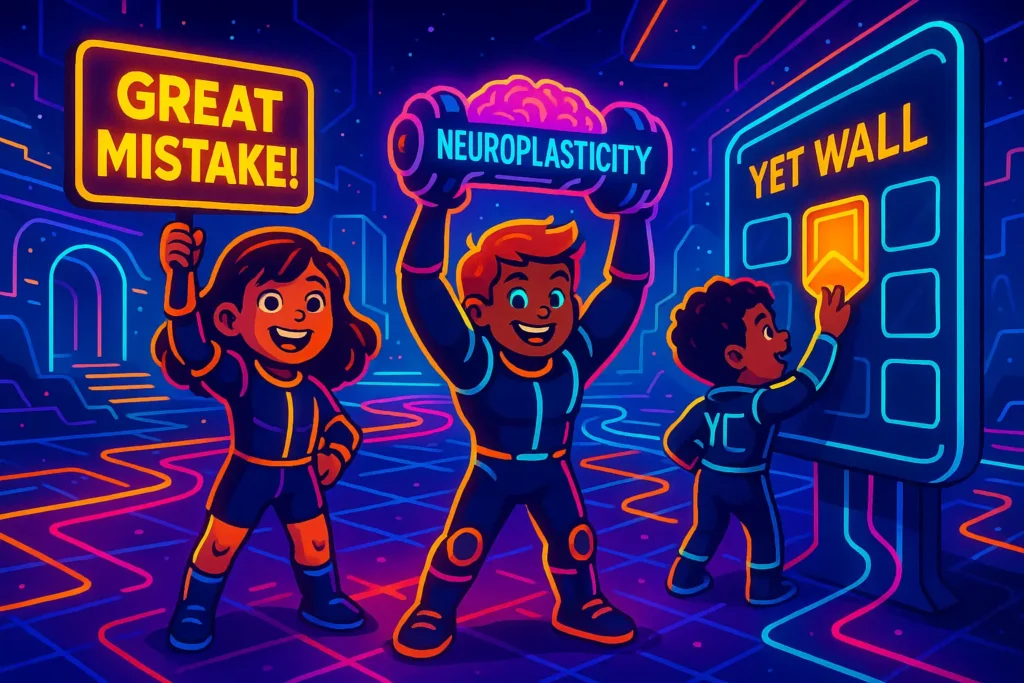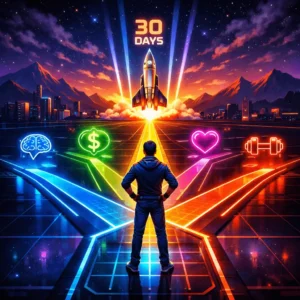The concept of growth mindset, developed by psychologist Carol Dweck, has revolutionized how we understand learning and achievement. Unlike a fixed mindset that views abilities as unchangeable traits, a growth mindset embraces the idea that intelligence, talents, and skills can be developed through effort, good strategies, and input from others. For children, developing this mindset early creates a foundation for lifelong learning, resilience, and success in our increasingly AI-powered world.
Upgrades From This Article:
- Transform Your Child’s Response to Challenges – Learn specific techniques like the “Power of Yet” and mistake celebrations that help kids view obstacles as growth opportunities instead of roadblocks, building lifelong resilience.
- Access Ready-to-Use Activity Collection – Get immediate access to proven growth mindset games, middle school-specific exercises, and daily implementation strategies you can start using today with any child.
- Future-Proof Learning Skills – Discover how to prepare kids for AI-enhanced learning environments while maintaining critical thinking and creativity, ensuring they thrive in tomorrow’s educational landscape.
These upgrades emphasize the practical, immediate value readers will gain while highlighting the importance of growth mindset activities for kids.
Understanding Growth Mindset in Children
Children naturally possess curiosity and willingness to try new things, but they can quickly develop limiting beliefs about their abilities based on feedback and experiences. A growth mindset helps kids understand that their brains are like muscles that grow stronger with exercise. When children believe they can improve through practice and effort, they become more willing to take on challenges, persist through difficulties, and view mistakes as learning opportunities rather than failures.
The benefits of fostering growth mindset extend far beyond academic achievement. Kids with growth mindsets tend to be more resilient, creative, and collaborative. They develop better emotional regulation skills and are more likely to seek help when needed. These children also show increased motivation and engagement in learning activities, leading to better long-term outcomes both in school and life.
Essential Growth Mindset Activities for Kids
The Power of “Yet” – A Foundation Growth Mindset Activity
One of the most fundamental growth mindset activities for kids involves teaching children to add the word “yet” to their self-talk. When a child says “I can’t do math,” encourage them to say “I can’t do math yet.” This simple addition transforms a fixed statement into a growth-oriented one, suggesting that improvement is possible with time and effort.
Create “Yet” charts where children can write down things they can’t do yet, then celebrate when they move items to the “I can do this now” column. This visual representation helps kids see their progress over time and reinforces that abilities can be developed through persistence and practice.
Brain Training Discussions
Help children understand how their brains work by explaining neuroplasticity in age-appropriate ways. Use analogies like comparing the brain to a muscle that gets stronger with exercise, or pathways in the brain that become highways with practice. When children understand that their brains are constantly changing and growing, they become more motivated to put in effort.
Encourage children to talk about what their brain did when they learned something new. Questions like “What did your brain have to do to figure that out?” or “How did your brain grow today?” help kids become aware of their learning process and develop metacognitive skills essential for future learning.
Mistake Celebrations
Transform the way children view mistakes by creating a culture that celebrates them as learning opportunities. When a child makes an error, respond with enthusiasm: “Great mistake! What can we learn from this?” This growth mindset activity helps children see mistakes as valuable feedback rather than something to avoid or hide.
Implement “Mistake of the Week” celebrations where children share interesting mistakes they made and what they learned from them. This activity normalizes the learning process and shows that everyone, including adults, makes mistakes while learning.
Related Article: How to Overcome the Fear of Failure
Process-Focused Praise
Instead of praising intelligence or talent (“You’re so smart!”), focus on effort, strategies, and improvement. Comments like “I can see how hard you worked on that problem” or “You tried three different strategies until you found one that worked” reinforce the growth mindset message that effort and strategy matter more than natural ability.
Create specific praise frameworks that highlight the learning process. For example, “I noticed you didn’t give up when the first method didn’t work. You kept trying different approaches until you solved it. That’s what mathematicians do!”
Growth Mindset Activities for Middle School
Middle school presents unique challenges as students face increased academic demands and social pressures. Growth mindset activities for middle school students need to address these developmental considerations while building on foundational concepts established in elementary years.
Goal-Setting and Reflection Journals
Middle school students benefit from structured goal-setting activities that help them track their progress over time. Encourage students to set both short-term and long-term goals, focusing on specific skills they want to develop rather than just outcomes they want to achieve.
Weekly reflection journals can help students identify strategies that work for them, recognize their growth, and plan for future challenges. Prompt questions might include: “What did I struggle with this week and how did I work through it?” or “What new strategy did I try and what were the results?”
Peer Collaboration and Feedback
Create opportunities for middle schoolers to work together on challenging problems, emphasizing that everyone brings different strengths to the group. Teach students how to give and receive constructive feedback, focusing on specific behaviors and strategies rather than personal characteristics.
Implement peer tutoring programs where students can both teach and learn from each other. This reinforces that everyone has something to contribute and that teaching others helps solidify one’s own understanding.
Challenge-Based Learning Projects
Design projects that require students to step outside their comfort zones and develop new skills. These might include research projects on topics they’ve never studied, creative assignments that require new techniques, or collaborative challenges that need diverse skill sets.
Emphasize the learning process throughout these projects, having students document their challenges, strategies, and breakthroughs. This helps them see that struggle and confusion are natural parts of learning something new.
Creative Growth Mindset Games
Learning through play makes growth mindset concepts more engaging and memorable for children. Here are several growth mindset games that can be adapted for different ages and settings.
The Growth Mindset Board Game
Create a board game where players move forward by sharing examples of growth mindset thinking or actions they’ve taken to overcome challenges. Include cards with scenarios that require players to choose between fixed and growth mindset responses, discussing why growth mindset choices lead to better outcomes.
Strategy Switching Challenges
Present puzzles or problems that can’t be solved with the first approach most people try. As children work through these challenges, encourage them to switch strategies when one isn’t working. This growth mindset game teaches flexibility and persistence while showing that there are often multiple ways to solve problems.
Growth Mindset Charades
Act out different growth mindset concepts and behaviors, such as “asking for help,” “trying a new strategy,” or “persisting through difficulty.” This kinesthetic approach helps children internalize growth mindset behaviors and makes the concepts more memorable.
The Learning Ladder Game
Create a physical or digital ladder where children climb higher by demonstrating growth mindset behaviors. Each rung represents a different aspect of growth mindset, such as embracing challenges, learning from feedback, or celebrating effort over outcome.
Fostering Growth Mindset Through Storytelling
Stories and narratives provide powerful ways to illustrate growth mindset principles. Share biographies of people who overcame significant challenges through effort and persistence. Focus on the struggles and setbacks these individuals faced, not just their eventual success.
Encourage children to create their own growth mindset stories, either about fictional characters or their own experiences. This helps them internalize the narrative that abilities can be developed and that setbacks are temporary obstacles rather than permanent limitations.
Use picture books and chapter books that showcase characters learning new skills, overcoming fears, or persisting through difficulties. After reading, discuss the characters’ mindsets and strategies, connecting them to the children’s own experiences.
AI-Powered Growth Mindset Activities for Kids
Revolutionary AI Growth Mindset Activities
As artificial intelligence transforms education, growth mindset activities for kids must evolve to prepare young learners for an AI-enhanced future. The integration of AI tools offers unprecedented opportunities to personalize learning experiences and accelerate growth mindset development.
AI-powered growth mindset activities can adapt in real-time to each child’s learning style, providing customized challenges that maintain the perfect balance between difficulty and achievability. These intelligent systems can identify when a child is ready for the next level of challenge, ensuring continuous growth without overwhelming frustration.
Smart Learning Companions: AI That Thinks Like a Growth Mindset Coach
Modern AI tutoring systems can serve as 24/7 growth mindset mentors, providing immediate feedback and encouragement when children face learning obstacles. These AI companions can:
- Recognize struggle patterns and offer personalized strategies for overcoming specific challenges
- Celebrate effort and process rather than just correct answers, reinforcing growth mindset principles
- Suggest alternative approaches when children get stuck, modeling the flexibility essential to growth mindset thinking
- Track progress over time and help children visualize their learning journey
Interactive AI-Driven Growth Mindset Games
Growth mindset games powered by AI take traditional activities to new levels of engagement and effectiveness:
Adaptive Challenge Quests: AI algorithms create personalized learning adventures that adjust difficulty based on the child’s performance and emotional state. These games ensure children experience the “sweet spot” of challenge that promotes growth without causing discouragement.
AI Mistake Mentors: Virtual characters powered by natural language processing can have meaningful conversations with children about their mistakes, helping them extract learning from failures and develop resilience.
Collaborative Problem-Solving Platforms: AI facilitates group activities where children from different locations can work together on complex challenges, with the AI providing scaffolding and ensuring every participant can contribute meaningfully.
Teaching Kids to Be AI-Enhanced Learners
The most crucial growth mindset activity for the AI age is teaching children how to collaborate effectively with artificial intelligence. This involves:
Question Formulation Skills: Children learn that the quality of their questions determines the value of AI responses. This naturally develops curiosity and critical thinking—core components of growth mindset.
Iterative Thinking Practices: Working with AI teaches children to refine their ideas through multiple iterations, embracing the growth mindset principle that first attempts rarely yield perfect results.
AI-Human Partnership Projects: Children work on creative projects where they use AI as a brainstorming partner, learning that AI amplifies human creativity rather than replacing it.
Personalized Growth Mindset Coaching Through AI
Advanced AI systems can now provide individualized growth mindset coaching by:
- Analyzing learning patterns to identify when children need encouragement versus challenge
- Customizing motivational messages based on each child’s personality and preferences
- Suggesting specific strategies tailored to individual learning styles and current challenges
- Creating personalized reflection prompts that help children process their learning experiences
Future-Ready Growth Mindset Skills
Growth mindset activities for kids in the AI era must prepare children for a world where:
- Continuous learning is essential as technology rapidly evolves
- Human-AI collaboration becomes the norm in most professions
- Adaptability matters more than memorizing static information
- Creative problem-solving distinguishes human contributions from AI capabilities
Read More: How to Work on Yourself
Implementing Growth Mindset Activities in Daily Life
The most effective growth mindset development happens through consistent, daily practices rather than isolated activities. Integrate growth mindset language and concepts into regular routines, homework time, and family conversations.
Create family or classroom traditions that reinforce growth mindset values. This might include weekly sharing of challenges overcome, monthly goal-setting sessions, or daily reflections on learning and growth. The key is making growth mindset thinking a natural part of how children approach their daily experiences.
Model growth mindset thinking in your own life, sharing your own learning challenges and how you work through them. Children learn more from what they observe than what they’re told, so demonstrating growth mindset behaviors in your own problem-solving and learning sends a powerful message.
Remember that developing a growth mindset is itself a process that takes time and practice. Be patient with children as they learn to shift their thinking patterns, and celebrate small steps toward growth mindset thinking. With consistent support and engaging activities, children can develop the resilience and love of learning that will serve them throughout their lives.
Related Article: Family Habits
Conclusion: Growth Mindset Activities for Kids
The journey toward developing a growth mindset is ongoing, requiring patience, practice, and consistent reinforcement. By implementing these varied growth mindset activities for kids, educators and parents can help children build the foundation for lifelong learning, resilience, and success in an ever-changing world.
As AI continues to reshape how we learn and work, growth mindset activities for middle school students and younger children become even more critical. The combination of traditional growth mindset principles with AI-enhanced learning tools creates unprecedented opportunities for personalized, effective education that prepares children not just for academic success, but for thriving in an AI-integrated future.
Through thoughtful implementation of these growth mindset games and activities, we can ensure that the next generation develops both the technological fluency and the resilient mindset needed to navigate and shape tomorrow’s world.
🚀 GROWTH MINDSET UNLOCKED—NOW LET’S UPGRADE ALL 5 CORE AREAS
The growth mindset strategies you just discovered are actually one piece of a much bigger, more exciting puzzle. What if your family could apply this same science-backed, gamified approach to not just learning and mindset, but to every area of life that contributes to long-term happiness?
The AI Habits Coach takes everything you’ve learned about developing resilient, growth-oriented thinking and expands it into a complete, AI-powered life transformation platform. Instead of just focusing on mindset, our system helps families build momentum across all 5 Core Areas of Life: Mindset, Career & Finances, Relationships, Physical Health, and Emotional & Mental Health.
Just like the growth mindset activities in this article, our system makes personal development feel like playing your favorite game—complete with points, levels, achievements, and that same “Power of Yet” thinking applied to every habit you want to build. The AI personalization ensures each family member gets challenges perfectly tailored to their unique strengths, goals, and growth style.
Your children are already learning that their brains can grow stronger with practice. Now imagine if they could experience that same exciting growth in their confidence, relationships, health habits, and future-planning skills—all while having fun and building unstoppable momentum as a family.
Ready to level up from just growth mindset to complete life momentum? Discover how the Moore Momentum System transforms everything you just learned into a gamified family adventure.






